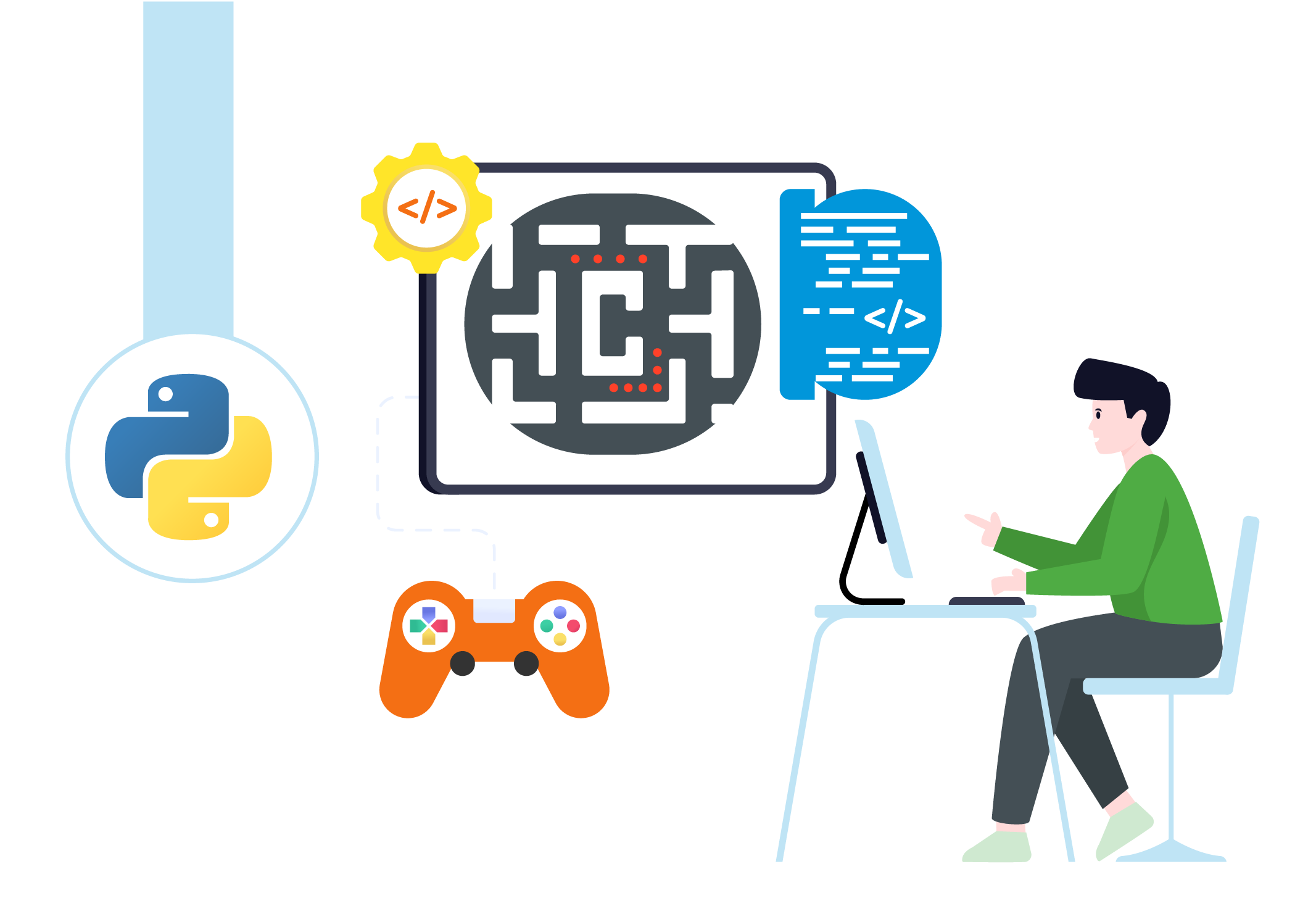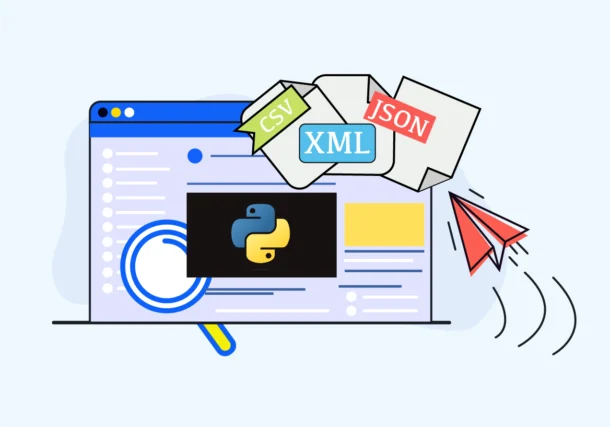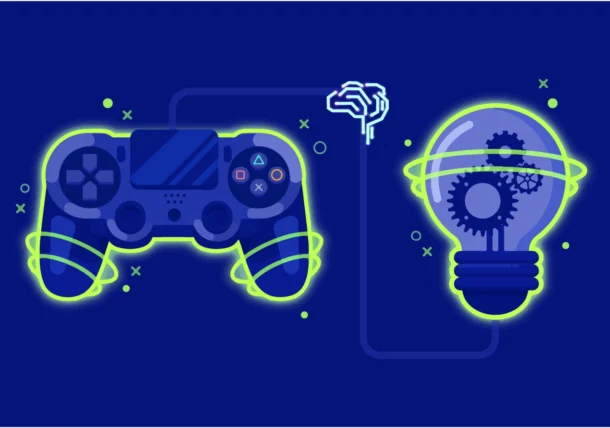Steering into the Python Game Development World
Games are indeed the most entertaining and interactive parts of our daily lives. It holds multiple ways to engage with stories, challenges, and the world as well. Moreover, they come in various genres as well, from action-packed to role-playing adventures bringing a lot to the plate. But when it comes to game development it certainly involves various stages like concept, design, development, testing, and deployment. On the other hand, it is very necessary to find the right programming language that can make a perfect game for all the users or audiences. Before diving into this topic, do you know which programming language is used to develop a game? It’s Python, yes you have read it right!

Python has a rich extensive library, and readability and holds its simplicity which makes it a popular choice for game development. Python for game development is generally used for 2D games, indie projects, and prototype projects. Also, it provides an accessible entry for all the game development and it is the most favorable option for all the developers who are seeking a balance between game creation potentiality and ease of use. But hold on, are you still thinking why Python has been the best choice, apart from its simplicity and extensive libraries? Don’t worry, we have got you covered in this blog!
We welcome you here in this piece of the article where we will be dealing with the basics of Python game development, and also we will have a glance at its advantages as well! Furthermore, we will also understand which Python tools are used for developing a game and several takeaways from Python. But this is not the end of the blog, we will also take a ride on understanding the case studies to have an eye on understanding which game has been developed using Python. So let’s get started with this blog!
Harnessing the Code of Python Game Development
Game development using Python has been a reliable choice for ages. It is particularly used for certain types of games like 2D games, indie projects, and prototypes. Python’s clean syntax and vast ecosystem of libraries offer developers with flexibility to bring all their creativity into reality. Also, python’s libraries like Pygame, and Panda3D, facilitate the creation of vast and captivating gaming experiences across several other genres. Moreover, python’s syntax is a beginner-friendly language that allows developers to grasp the idea and its concepts quickly. Games that use Python for gaming development are 2D Platform, puzzle games, strategy games, arcade games, and multiplayer online games.

Besides one key advantage of Python game development is its simplicity and readability which allows developers to write clean and concise code. Furthermore, this reliability makes the development process more easier and enjoyable and also provides collaboration with other fellow developers as well, which overall saves time and effort. And Python also has cross-platform compatibility which runs on several other different platforms and operating systems. This cross-platform compatibility is very crucial because it reduces the time development and effort by removing all the need to write separate code for every platform.
Majorly Python’s key strength lies in its accessibility to all the developers of all the skills they inherit in the rooms. All the developers who are beginners can quickly grab the idea of syntax and prototype the simple game from scratch while, on the other hand, experienced developers can deal with more complex projects with a snap of the fingers or with ease. Python’s extensive documentation and community support all the developers to troubleshoot the issues and seek guidance throughout the game development process.
The Winning Advantages Of Game Development Using Python
Python game development brings a plethora of advantages on the table. To begin with, python can easily integrate with AI. Yes, it does, can’t believe it? So Python has compatibility with all the machine and AI libraries like TensorFlow, and Keras. This overall enhances the gameplay and all the other interactivity that entirely drives the better gaming experience to the new era. Also, python implementation with AI allows game developers to integrate intelligent behavior with adaptive Non-player characters and dynamic environments. Besides, with all these Python libraries, developers can create all the AI-driven opponents that are pertinent to decision-making, and adaptive game mechanics that respond to all the player actions.

Another added advantage of game development using Python is that it has an easy-to-understand syntax that has simplicity and readability to minimize all the intricacies of code, which makes it accessible to seasoned developers and designers. Moreover, with the feature of clear and concise code, python offers collaboration among the development teams. This helps game developers to grasp the codebase which overall offers better communication with technical and creative roles.
Also, they can easily grab the entire logic behind the code. Moreover, python game development also offers dynamic typing in real-time assets in developing a game that removes the requirement for all the declared variable types in advance. Certainly, this feature allows the developer to test their ideas appropriately, alongside experimenting with them, hence boosting the efficiency of the entire game development cycle.
Not to forget about mentioning the major advantage is that Python offers an abundance of libraries and frameworks to all fellow developers to build a diverse and engaging game for all users worldwide. Some markable tools are Pygame, Kivy, Pymunk, and PyODE are some of the libraries and frameworks of Python for building games. This programming language python, also has a feature called object-oriented, which is capable of creating and modifying the object efficiently. This flexibility impact reduces the need for code writing, hence making the development process of a game smooth. With this advantage, developers can easily define and manipulate the objects, attributes, and properties easily, which promotes code reusability and modularity.
Boosting The Alchemy of Game Development by Python’s Tools
Now let’s dive into understanding some tools of Python in gaming development for creating such massive creativity for all users. The first is Pygame which is a popular Python library that is used in game development. It provides a certain set of functions and modules for developing a game and this also allows developers to create 2D games with ease, handling graphics, and user inputs. Also with this certain type of library, developers can majorly focus on designing the game and mechanics that give a life to the game.
Another library is Panda3D, which is considered to be an open-source framework that simplifies the development of games like 3D games. Also, Python offers a massive range of features like advanced rendering capabilities, networking tools, and physics simulation. With this framework Panda3D, developers can build a visually stunning game world. Pyglet is another library that is lightweight and majorly focuses on efficient 2D Python game development.
It offers a vast set of tools to handle all the multimedia and other user inputs. With Pyglet, developers can create visually appealing 2D games that run entirely smoothly across different platforms. Kivy is another Python framework that offers cross-platform compatibility. It facilitates the creation of interactive experiences that include support for multitouch interfaces and the ability to build user interfaces dynamically. It has graphic rendering capabilities that allow developers to design visually engaging games.
Revealing the Features and Insights of Python in Game Development
As we all know about Python, it has a very clean syntax and offers an easy-to-understand code structure that makes it very accessible to all beginners and experienced programmers as well. Python is very easy to learn and also it allows developers to quickly dive into game development without learning more about it. Python in gaming also offers an extensive collection of libraries and frameworks which is coherently designed for all game development. Most of the Python libraries like PYgame, Panda3D, and Kivy provide developers with a vast range of tools and other resources to create the best game worlds for all users or audiences.
It has a feature like multiplatform support that allows developers to write code that can be easily executed across various platforms like Windows, macOS, and Linux. Furthermore, python can easily interface with other programming languages as well like C/C++ which allows developers to utilize all the benefits of low-level languages for all the computational tasks.
The additional insight about game development using Python is that it provides a feature that has very stunning graphics, with immersive audio in a game that allows users or audiences to stay intact in a game. Developers can also utilize these capabilities to create and design a visually stunning and captivating game world.
Additionally, python game development also offers a vast range of functionalities for handling all the user inputs that allow developers to implement all the intuitive controls and also the responsive gameplay mechanics. Also with the help of Pygame and Panda3D, it consists of a built-in support for all the game physics simulation that allows developers to create a very realistic and interactive game world. Besides, not forgetting Python’s versatility, it allows developers to create intelligent NCPs and integrate all the advanced game logic. This overall opens up an era of new possibilities for creating the best gaming experience.
Nearing the Endgame of Python Game development with Pattem Digital
Let’s sketch a conclusion here, as we have seen that Python stands as a vital force in the industry of game development and offers a major feature and insights that elevate creativity to all new levels. Python’s clean syntax and extensive library ecosystem offer a fertile ground for fellow developers of all levels to create a game that captivates users. Python’s cross-platform compatibility, seamless integration with AI, and dynamic typing streamline the development process, fostering collaboration and efficiency. With tools like Pygame, Panda3D, and Kivy, developers wield the power to craft immersive gaming experiences that captivate audiences worldwide.
At Pattem Digital, a leading Python development service, we recognize the transformative potential of Python in game development. On capitalizing on our expertise in Python and game design, we set forth on a journey to create captivating gaming experiences that push the boundaries of imagination. Through meticulous attention to detail and innovative problem-solving, we strive to deliver games that resonate deeply with players, leaving an indelible mark on the gaming landscape.





